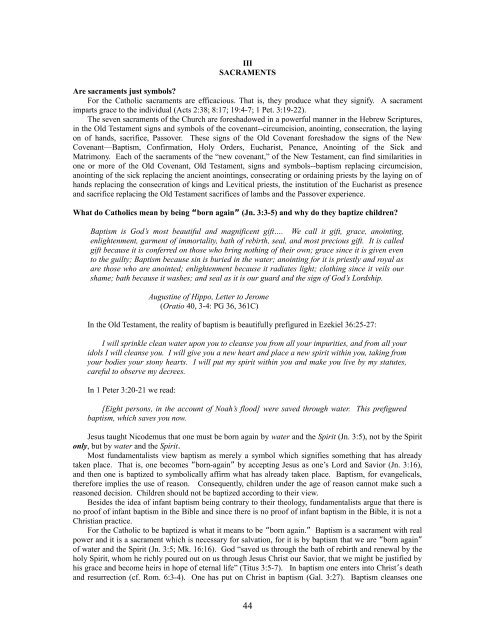Ecce Fides - Pillar of Truth - St. Patrick's Basilica
Ecce Fides - Pillar of Truth - St. Patrick's Basilica
Ecce Fides - Pillar of Truth - St. Patrick's Basilica
You also want an ePaper? Increase the reach of your titles
YUMPU automatically turns print PDFs into web optimized ePapers that Google loves.
III<br />
SACRAMENTS<br />
Are sacraments just symbols?<br />
For the Catholic sacraments are efficacious. That is, they produce what they signify. A sacrament<br />
imparts grace to the individual (Acts 2:38; 8:17; 19:4-7; 1 Pet. 3:19-22).<br />
The seven sacraments <strong>of</strong> the Church are foreshadowed in a powerful manner in the Hebrew Scriptures,<br />
in the Old Testament signs and symbols <strong>of</strong> the covenant--circumcision, anointing, consecration, the laying<br />
on <strong>of</strong> hands, sacrifice, Passover. These signs <strong>of</strong> the Old Covenant foreshadow the signs <strong>of</strong> the New<br />
Covenant—Baptism, Confirmation, Holy Orders, Eucharist, Penance, Anointing <strong>of</strong> the Sick and<br />
Matrimony. Each <strong>of</strong> the sacraments <strong>of</strong> the “new covenant,” <strong>of</strong> the New Testament, can find similarities in<br />
one or more <strong>of</strong> the Old Covenant, Old Testament, signs and symbols--baptism replacing circumcision,<br />
anointing <strong>of</strong> the sick replacing the ancient anointings, consecrating or ordaining priests by the laying on <strong>of</strong><br />
hands replacing the consecration <strong>of</strong> kings and Levitical priests, the institution <strong>of</strong> the Eucharist as presence<br />
and sacrifice replacing the Old Testament sacrifices <strong>of</strong> lambs and the Passover experience.<br />
What do Catholics mean by being “born again” (Jn. 3:3-5) and why do they baptize children?<br />
Baptism is God’s most beautiful and magnificent gift…. We call it gift, grace, anointing,<br />
enlightenment, garment <strong>of</strong> immortality, bath <strong>of</strong> rebirth, seal, and most precious gift. It is called<br />
gift because it is conferred on those who bring nothing <strong>of</strong> their own; grace since it is given even<br />
to the guilty; Baptism because sin is buried in the water; anointing for it is priestly and royal as<br />
are those who are anointed; enlightenment because it radiates light; clothing since it veils our<br />
shame; bath because it washes; and seal as it is our guard and the sign <strong>of</strong> God’s Lordship.<br />
Augustine <strong>of</strong> Hippo, Letter to Jerome<br />
(Oratio 40, 3-4: PG 36, 361C)<br />
In the Old Testament, the reality <strong>of</strong> baptism is beautifully prefigured in Ezekiel 36:25-27:<br />
I will sprinkle clean water upon you to cleanse you from all your impurities, and from all your<br />
idols I will cleanse you. I will give you a new heart and place a new spirit within you, taking from<br />
your bodies your stony hearts. I will put my spirit within you and make you live by my statutes,<br />
careful to observe my decrees.<br />
In 1 Peter 3:20-21 we read:<br />
[Eight persons, in the account <strong>of</strong> Noah’s flood] were saved through water. This prefigured<br />
baptism, which saves you now.<br />
Jesus taught Nicodemus that one must be born again by water and the Spirit (Jn. 3:5), not by the Spirit<br />
only, but by water and the Spirit.<br />
Most fundamentalists view baptism as merely a symbol which signifies something that has already<br />
taken place. That is, one becomes “born-again” by accepting Jesus as one’s Lord and Savior (Jn. 3:16),<br />
and then one is baptized to symbolically affirm what has already taken place. Baptism, for evangelicals,<br />
therefore implies the use <strong>of</strong> reason. Consequently, children under the age <strong>of</strong> reason cannot make such a<br />
reasoned decision. Children should not be baptized according to their view.<br />
Besides the idea <strong>of</strong> infant baptism being contrary to their theology, fundamentalists argue that there is<br />
no pro<strong>of</strong> <strong>of</strong> infant baptism in the Bible and since there is no pro<strong>of</strong> <strong>of</strong> infant baptism in the Bible, it is not a<br />
Christian practice.<br />
For the Catholic to be baptized is what it means to be “born again.” Baptism is a sacrament with real<br />
power and it is a sacrament which is necessary for salvation, for it is by baptism that we are “born again”<br />
<strong>of</strong> water and the Spirit (Jn. 3:5; Mk. 16:16). God “saved us through the bath <strong>of</strong> rebirth and renewal by the<br />
holy Spirit, whom he richly poured out on us through Jesus Christ our Savior, that we might be justified by<br />
his grace and become heirs in hope <strong>of</strong> eternal life” (Titus 3:5-7). In baptism one enters into Christ’s death<br />
and resurrection (cf. Rom. 6:3-4). One has put on Christ in baptism (Gal. 3:27). Baptism cleanses one<br />
44






